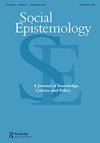Universities as Anarchic Knowledge Institutions
IF 2
2区 哲学
Q1 HISTORY & PHILOSOPHY OF SCIENCE
引用次数: 0
Abstract
Universities are knowledge institutions. Compared to several other knowledge institutions (e.g. schools, government research organisations, think tanks), research universities have unusual, anarchic organisational features. We argue that such anarchic features are not a weakness. Rather, they reflect the special standing of research universities among knowledge institutions. We contend that the distributed, self-organising mode of knowledge production maintains a diversity of approaches, topics and solutions needed in frontier research, which involves generating relevant knowledge under uncertainty. Organisational disunity and inconsistencies should sometimes be protected by institutional structures and procedures in order for research universities to best serve their purpose as knowledge institutions. The quality control for the knowledge produced stems from knowledge fields, clusters of knowledge and research that exist beyond the confines of individual organisations. The diversity of epistemic contributions is therefore kept in check by the order imposed by the internal logic of science as a social practice. Our argument provides a new defence for the autonomy of research conducted at universities.作为无政府知识机构的大学
大学是知识机构。与其他一些知识机构(如学校、政府研究机构、智库)相比,研究型大学具有不同寻常的无政府组织特征。我们认为,这种无政府主义特征并不是一种弱点。相反,它们反映了研究型大学在知识机构中的特殊地位。我们认为,知识生产的分布式、自组织模式保持了前沿研究所需的方法、主题和解决方案的多样性,这涉及在不确定性下产生相关知识。组织的不统一和不一致有时应该得到体制结构和程序的保护,以便研究型大学最好地发挥其作为知识机构的作用。对所产生的知识的质量控制源于知识领域、知识集群和存在于个体组织范围之外的研究。因此,认识贡献的多样性受到作为社会实践的科学的内在逻辑所施加的秩序的制约。我们的论点为大学的研究自主权提供了新的辩护。
本文章由计算机程序翻译,如有差异,请以英文原文为准。
求助全文
约1分钟内获得全文
求助全文
来源期刊

Social Epistemology
Multiple-
CiteScore
2.60
自引率
17.60%
发文量
60
期刊介绍:
Social Epistemology provides a forum for philosophical and social scientific enquiry that incorporates the work of scholars from a variety of disciplines who share a concern with the production, assessment and validation of knowledge. The journal covers both empirical research into the origination and transmission of knowledge and normative considerations which arise as such research is implemented, serving as a guide for directing contemporary knowledge enterprises. Social Epistemology publishes "exchanges" which are the collective product of several contributors and take the form of critical syntheses, open peer commentaries interviews, applications, provocations, reviews and responses
 求助内容:
求助内容: 应助结果提醒方式:
应助结果提醒方式:


